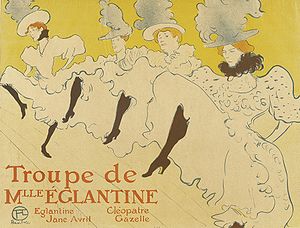
Back كنكان (رقص) Arabic Cancán AST Kan kan Azerbaijani Канкан Byelorussian Канкан BE-X-OLD Cancan (dansa) Catalan Kankán Czech Cancan Danish Cancan German Kankano Esperanto

The[1] can-can (also spelled cancan as in the original French /kɑ̃kɑ̃/) is a high-energy, physically demanding dance that became a popular music-hall dance in the 1840s, continuing in popularity in French cabaret to this day.[2] Originally danced by couples, it is now traditionally associated with a chorus line of female dancers.[3] The main features of the dance are the vigorous manipulation of skirts and petticoats, along with high kicks, splits, and cartwheels.
- ^ Can, Can. "Wikipedia, the free encyclopedia". en.wikipedia.org. Retrieved 2 July 2024.
- ^ Nadège Maruta, L'Incroyable Histoire de Cancan: Rebelles et Insolentes, les Parisiennes Mênent la Danse (Paris: Parigramme, 2014).
- ^ Marie-Franççpose Christout, "Can-can", in International Encyclopedia of Dance, edited by Selma Jeanne Cohen and others (New York: Oxford University Press, 1998), vol. 2, pp. 52–53.
